As we continue to look at the spiritual armor God has given us for our spiritual battle, we look at the breastplate. Specifically in Ephesians 6:14, Paul calls it the breastplate of righteousness.
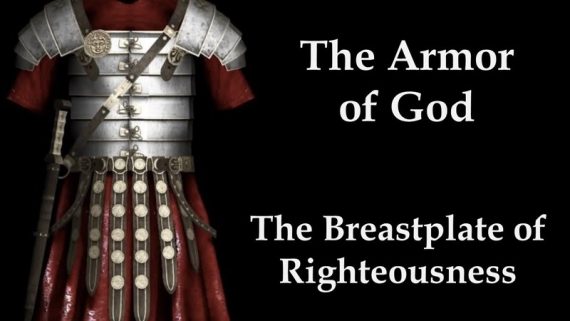
And just as with the belt of truth, we will look at this second piece of the armor in three ways. First, how it was used on the soldier, second, how it is to be used for us as Christians in spiritual battle, and then finally, how we can put it on for battle.
Let us begin with what the breastplate did for the soldier.
The Breastplate for the Soldier
 As the name implies, the breastplate of the Roman soldier was worn on the chest or torso of the soldier. Although at times, they were made out of leather, the breastplates worn by soldiers in Paul’s day were typically made from iron.
As the name implies, the breastplate of the Roman soldier was worn on the chest or torso of the soldier. Although at times, they were made out of leather, the breastplates worn by soldiers in Paul’s day were typically made from iron.
But the breastplates were not made from one solid piece of metal the way we might imaging seeing on a knight in medieval England. It was not plate armor.
The Roman soldier’s armor was scale armor. The Roman military breastplate was made of overlapping bands of metal that were then tied together with leather cords. This made the Roman breastplate more flexible and maneuverable than the kind of breastplates the knights wore.
The scale armor of the Roman soldier was much lighter and more flexible than the suits of armor worn by medieval knights. Remember, the Roman soldier had to run 24 miles in five hours while wearing his armor. I doubt that a medieval knight, wearing a full suit of armor, could run five miles in five hours.
This type of breastplate construction helped the Roman soldier on the field of battle. They were light on their feet, and the flexible breastplate enabled them to make quick maneuvers and changes during the battle.
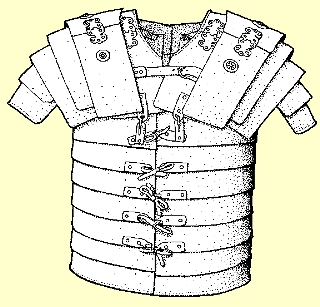 And what was the purpose of the breastplate? It helped protect the soldier’s vital organs, such as the heart, lungs, and the entire digestive tract. If any of these organs were damaged in battle, the soldier was almost certain to die.
And what was the purpose of the breastplate? It helped protect the soldier’s vital organs, such as the heart, lungs, and the entire digestive tract. If any of these organs were damaged in battle, the soldier was almost certain to die.
So the breastplate was obviously important. It was made of strips of metal so that it could be light and flexible, and it’s main purpose was to protect the vital organs of the soldier.
With this in mind, let us move on to see how the spiritual breastplate is to be used for the Christian in spiritual warfare.
The Breastplate for the Christian
As we seek to discover the role and function the spiritual breastplate serves for the Christian, it is important to remember that the breastplate is connected to and held in place by the belt of truth (cf. how the two are connected in Ephesians 5:9).
And the belt of truth is Scripture, the Word of God. We put on the belt of truth by reading, studying, and learning what Scripture says. The breastplate of righteousness then, is the right way of living that comes from learning and obeying the truth of Scripture.
There is a major difference between understanding the truth and living the truth.
There is a difference between being able to recite verses and list Bible facts, and actually living or applying those verses and Bible facts to your life.
 Do you remember the Pharisees? They were Bible scholars. They were experts of the law. Most of them had the entire Torah—the first five books of the Bible—memorized. They knew the history of Israel forward and backward. They prayed and sang the Psalms. They could recite passages from the Prophets.
Do you remember the Pharisees? They were Bible scholars. They were experts of the law. Most of them had the entire Torah—the first five books of the Bible—memorized. They knew the history of Israel forward and backward. They prayed and sang the Psalms. They could recite passages from the Prophets.
But this group of religious leaders disagreed with most of what Jesus said and taught, and it is for them that Jesus reserved His most scalding rebukes. For example, in Matthew 23:27-28, Jesus says,
Woe to you, scribes and Pharisees, hypocrites! For you are like whitewashed tombs which indeed appear beautiful outwardly, but inside are full of dead men’s bones and all uncleanness. Even so you also outwardly appear righteous to men, but inside you are full of hypocrisy and lawlessness.
These men were outwardly righteous. They appeared righteous to others. They had all the right words, and all the right actions, and all the right behaviors. But Jesus says to them, “It doesn’t matter what you look like on the outside. All that matters is how you look on the inside. What does your heart look like?”
This is what the breastplate of righteousness is for. Just as the breastplate was made of many interlocking strips of metal tied together to protect the vital organs of a soldier, so also, all the numerous passages of Scripture, when they are rightly understood and applied, work together as interlocking truths, to protect the vital functions of our life as a Christian.
Scripture keeps the desires of our heart on the right track, so that we desire the things of God, rather than the things of this world. In other words, to wear the breastplate of righteousness, we have to protect our heart, the center of who we are, by keeping our conscience pure.
 Scripture also keeps our spiritual lungs breathing deeply from the indwelling life of the Holy Spirit so that we can be guided and shaped into the image of Jesus Christ. Scripture allows us to properly digest and comprehend the things we experience in life so that these experiences can be used to guide and direct ourselves and others on the path toward peace and unity.
Scripture also keeps our spiritual lungs breathing deeply from the indwelling life of the Holy Spirit so that we can be guided and shaped into the image of Jesus Christ. Scripture allows us to properly digest and comprehend the things we experience in life so that these experiences can be used to guide and direct ourselves and others on the path toward peace and unity.
When properly protected and informed by Scripture, our godly desires, the indwelling Holy Spirit, and our life experiences lead us into the life of righteousness that God wants for us.
But what is righteousness?
Before we can learn how to put it on, we must know what it is. There is a whole set of English words that are all related to one another and attempt to explain a single biblical concept. The words include terms like justification, justice, justify, righteous, and righteousness. They all come from the Greek words dikē, dikaiosunē, dikaioō, and dikaios. If you want to learn more, my Gospel Dictionary Course will eventually have a lesson on “Righteousness”
The words are all related in concept and themes, and refer to the judgments, decisions, or announcements of an authority figure about the condition or “rightness” of someone or something else. All of these words carry the idea of something being “in the right.”
So, for example, a judge or justice might declare a person to be “in the right,” that is, not guilty (cf. Rom 3:23-25). An accountant might declare a set of ledgers or financial records “in the right,” equaled, or properly balanced. Government officials might ratify (or “rightify”) a treaty with another government or organization, thereby stating that both parties of the treaty agree that the terms of the treaty are correct, or “in the right.”
So this word family is one of those biblical terms where various English words have been used to translate the one set of Greek words, which then leads to some confusion about the meaning of the words. Some of this conclusion could be cleared up if Bible translators picked a word and stuck with it.
The two best options are the English words “right” and “just.” If they went with “right” then we would talk about righteousness, rightness, being in the right, and ratify. If we went with the word “just” we could speak of justice, justification, and justify.
Regardless of which term is used, however, there is something that must be noticed about this particular word family. When something is ratified, justified, or declared right, it is only a statement about the present and current condition of the person, ledgers, or treaty. It says nothing about their future condition.
If an accountant looks at a set of financial books and discovers that they are balanced, he will declare them to be justified. They are balanced. But this does not mean that an error or mistake will not be made tomorrow or next month which will put them out of balance.
Similarly, if two governments ratify a treaty, there is the expectation that they will abide by the terms of this treaty in the future, but history has shown that countries and governments break the terms of treaties all the time. So the current agreement on the terms of a treaty do not guarantee that the treaty will always be in effect.
 Furthermore, even if a judge declares a person to be “not guilty” of a particular crime, this does not mean that the person will not commit that particular crime in the future. So the declaration of “rightness” is only about the present condition of something; it says nothing about the future.
Furthermore, even if a judge declares a person to be “not guilty” of a particular crime, this does not mean that the person will not commit that particular crime in the future. So the declaration of “rightness” is only about the present condition of something; it says nothing about the future.
This brings us back around to the breastplate of righteousness that we are to wear. It’s is God’s breastplate, and He gives it to us. Why? Because we could never achieve it or earn it on our own. God’s standard of “rightness” is perfection. God, as the divine judge, the heavenly accountant, will not and cannot declare any person to be “right” unless they are perfectly holy and without sin.
But that is impossible for any human being. All have sinned and fallen short of the glory of God (Rom 3:23). In and of ourselves, not a single human being (other than Jesus) is “in the right.” But this was not acceptable to God, and so He decided to make His own perfect righteousness available to us. This is what Paul has in mind when he writes here about the breastplate of righteousness.
When God gives His breastplate of righteousness to us, He is saying, “No matter what you have done and no matter what you will do, your ledgers are balanced, your accounts are correct, you are justified because I have given My holiness to you.”
But of course, God doesn’t give His righteousness to everyone. As Paul states repeatedly in Romans and Galatians, God gives His righteousness only to those who believe in Jesus for it. God cannot force His righteousness on people; it can only be received by faith.
This righteousness we receive from God by faith then guides us into how God wants us to live the rest of our life by faith. This brings us to the discussion of how to take up and put on the breastplate of righteousness.

Putting on the Breastplate
To put on the breastplate of righteousness, we must first recognize that, just as with all the pieces of Spiritual armor, the breastplate of righteousness belongs to God. In Isaiah 59:17, we read that God wears righteousness as a breastplate. Isaiah 59 further reveals that this righteousness is not the positional, imputed righteousness that God gives to all believers the moment they believe in Jesus for everlasting life. Instead, it is the practical, day-to-day righteousness that God expects and desires all Christians to live by. It is living the holy life.
 But before we can wear the breastplate, we must have it. And as just indicated, we receive the righteousness of God by faith alone in Jesus Christ alone. We cannot earn or buy the breastplate of righteousness for ourselves. It is the free gift of God to anyone and everyone who simply and only believes in Jesus for it.
But before we can wear the breastplate, we must have it. And as just indicated, we receive the righteousness of God by faith alone in Jesus Christ alone. We cannot earn or buy the breastplate of righteousness for ourselves. It is the free gift of God to anyone and everyone who simply and only believes in Jesus for it.
However, receiving the righteousness of God by faith alone in Jesus Christ alone is not the same thing as living the righteous life that God wants and desires for us. Just as a declaration by an accountant that the books are balanced is no guarantee that the books will not make mistakes in the future, so also, though we have been declared right by God, we still often make mistakes in our lives.
Just as a judgment by a judge that a person is not guilty is no guarantee that the person will not break the law in the future, so also, the declaration of rightness by God is no guarantee that we will not break God’s law in the future.
Once we have received the righteousness of God, we must make sure we put it on and wear it. The breastplate of righteousness is only helpful in spiritual warfare if it is strapped around our chest.
So how do we put on the breastplate of righteousness? How do we make sure that the free gift of God’s positional and imputed righteousness becomes the practical and applied righteousness of God in our lives?
How do we make sure that God’s declaration that we are “in the right” with Him becomes the true reality of our life as we walk with Him? Since there is a difference between being declared right and actually living right, how can the spiritual reality of our righteousness from God become the practical reality of a righteous life?
The key to practical righteousness is to recognize that while all of us will continue to sin during this life, there are steps we can take to purify our lives and refrain from sin as we follow Jesus on the path of discipleship.
The breastplate of righteousness, remember, covers the vital organs of the body, such as the heart, lungs, and digestive tract. So when we seek to take up and put on the breastplate of righteousness, we seek to protect the vital and essential elements of our life as a Christian.
We seek to protect our heart and its desires. We maintain contact with the indwelling and purifying work of the Holy Spirit as we maintain a pure conscience before God. We make sure that the spiritual food we eat is healthy for the growth and development of our spiritual bodies.
The biblical practices of confession, purification, and repentance help us maintain righteousness and holiness in our lives. The first letter of these three terms form the acronym CPR, which is interesting because CPR is the practice of reviving a person when their heart or lungs stop working.
The breastplate protects these vital organs, but we can also restore them to proper functionality through spiritual CPR. Heart attacks often occur as a result of poor diet, but we can get a heart beating again and return breath to the lungs through spiritual CPR. If there is an area in your life where you are having a spiritual heart attack, or where you are about to be drowned by sin, God wants to get your heart beating and your lungs breathing again through spiritual CPR: Confession, Purification, and Repentance.
These three practices will help us achieve and maintain the practical righteousness of God in our lives. Let us briefly consider each.
Confession (1 John 1:9-10)
There is much confusion about confession. People wonder what they should confess, how they should confess, and who they should confess to. And then there is the question of how confession differs from repentance.
The basic definition of confession is that it occurs when we admit or agree that something we said, did, or thought was wrong. When we agree, admit, or confess that a behavior were wrong, this stops sin dead in its tracks. See “Confess” in my Gospel Dictionary course for more.
Quite often, we Christians do things we know are wrong. We know we are not supposed to lie, lust, steal, covet, or commit any number of other sins, but sometimes, in a moment of weakness, we engage in such sins anyway.
Afterwards, the Holy Spirit works with our conscience to convict us of our sin. The Spirit points out to us what we already know, that what we did was wrong. And if we agree with the convicting work of the Holy Spirit, then we confess our sin, and the sin does not take further root in our life.
John is teaching that when we sin, God often points out to us that what we did was wrong. When this happens, we are faced with a choice. We can either agree with God that our actions were wrong and then turn from them, or we can disagree with God and continue in our sinful behavior.
If we agree, then we are released from the potential addiction and destruction that this sinful behavior might bring upon us and are cleansed so we can follow Jesus in righteousness again.
If, however, we do not confess, if we do not agree with God that our behaviors were wrong, then we will continue in these destructive behaviors, and will likely become enslaved to a damaging and destructive pattern of sin in our lives. Sin will sink a hook into us, and will drag us down deeper into its destructive tendencies.

All patterns of sin begin by committing the particular sin the very first time. When this happens, God confronts us on it. He might do this through Scripture, or by the convicting work of the Holy Spirit, or maybe even through the gentle words of a trusted friend. If we ignore the corrective prodding from God, we will likely continue in this sin, committing it more and more frequently, until we become enslaved to it.
Sin will sink its claws into it. It will hook into us and not let us go. We will become addicted to this sin, until it becomes a destructive habit or pattern in our life.
John gives the solution to this problem in 1 John 1:9. He says that when we sin and God confronts us about it, we should own up to what we did. We should confess our sin, agree with God that what we did was wrong.
If we do this, then sin will not gain a foothold in our life. Instead, we will be released from the addicting power and destructive consequences of that sin. We will be cleansed from the unrighteous behavior, and will maintain the practical righteous life that God wants and desires for us. See “Confess” in my Gospel Dictionary course for more.
Now, there is a way to break free from the addicting and enslaving patterns of sin in our life as well, but confession will not be enough. We will need repentance for that. However, before we talk about repentance, let us consider purification.
Purification (James 4:8)
While purification and confession are similar, there is one main difference. Confession is necessary when we do something we knew was wrong. We knew it was wrong to lie, but we lied anyway, and then our conscience kicked in, so confessed to God and to the person we lied to.
Purification is different. Purification is necessary when we do something wrong that we didn’t initially know was wrong. Purification is required when we discover that some action or behavior we performed—maybe many years—is actually sinful and wrong, but we didn’t know it.
While confession is necessary when we do something we knew was wrong, purification is necessary when God reveals the truth to us about a sinful behavior we didn’t know was wrong.
God doesn’t really hold these sins against us, for He constantly cleanses and purifies us from all sin anyway, but once He takes our sanctification to the next level and start pointing out new areas in our life He wants us to work on, it is our responsibility to purify our lives from these sinful activities, beliefs, or behaviors.
Believe it or not, there are many sorts of activities in life that most people—including Christians—do not recognize as sinful. We all come to Christianity with a host of bad habits.
And that’s okay.
God doesn’t expect us to get rid of them all before we become a Christian, or even in the first few weeks, months, or years of being a Christian. He takes us just as we are, and works with us slowly over time. The process of sanctification is a life-long process.
 After we become a Christian, God begins to deal with us and some of our sinful ways of living, many of which most people don’t even think of as being sinful. As we seek to follow Jesus on the path of discipleship, He begins to show us that some of the things we are doing are not really what we should be doing.
After we become a Christian, God begins to deal with us and some of our sinful ways of living, many of which most people don’t even think of as being sinful. As we seek to follow Jesus on the path of discipleship, He begins to show us that some of the things we are doing are not really what we should be doing.
Some of the behaviors God wants to purify from our lives might seem a little surprising, because we didn’t even realize that what we were doing was wrong. Almost everyone knows that murder and adultery are wrong, but there are many sinful condemned by Scripture which few people realize are wrong.
Take money as an example. Many people, Christians included, think that the money they make is theirs to spend. Even though many Christians give a tithe, they assume the rest is theirs to keep, to do with as they please. But all money belongs to God, and He wants us to use money to love, serve, feed, and clothe others.
Gossip and slander also are a normal way of life for most people. We like to hear the newest juicy tidbit of news about other people. We Christians even like to spread gossip under the guise of sharing a “prayer request.” We say things like, “Did you hear about how Mr. and Mrs. Jones are going to marriage counseling? Yes, I heard they had a fight, and he went down to the local bar and had a few too many drinks. He ended up kissing a woman down there in front of everyone, and who knows what else they did… I wonder if they are going to get divorced. We should pray for them.” This is not a prayer request. This is Christian gossip.
Some of us have been engaging in these sorts of practices for years. Maybe even decades. And we never really knew they were wrong, because this is just how the world works. But eventually, through Bible study, prayer, a sermon, or the kind counsel of a Christian friend, we hear that a behavior we have always practiced is actually wrong and displeasing to God.
When this happens, we must make the choice to purify our lives from such behaviors. James 4:8 says, “Draw near to God and He will draw near to you. Cleanse your hands, you sinners; and purify your hearts, you double-minded.”
When we draw near to God, He draws near to us, and His closeness to us ends up shining light into the dark corners of our life, pointing out dust and cobwebs we never knew were there.
When God reveals to us that these behaviors are sinful, we are to cleanse our hands from such actions, and purify our hearts. In so doing, we will draw closer to God, and He will draw closer still to us. And of course, the process of purification will begin again.
The process of purification is a never-ending cycle of becoming more and more like Jesus, and more like the person God wants us to be.
So purification is different than confession. We purify our lives of sinful behaviors that we didn’t know were sinful until God pointed them out to us. But we are to confess the sins we commit which we knew were sinful when we committed them.
But what about when we engage in sinful practices that we know are sinful, and which we practice for a long time?
In other words, if we refuse to confess the actions we knew were sinful, or refuse to purify our lives from the sinful behaviors God revealed to us, what happens then? In this case, we continue to practice the sin. We will chase after it. It will become a pattern, a habit, or addiction, in our life. When this happens, there is only one way out: repentance.

Repentance (Luke 15:11-32)
One of the classic biblical stories about repentance is the Parable of the Prodigal Son in Luke 15:11-32. It is story about a father who has two sons. The younger son asks for his inheritance early, and then goes off to a far country to squander his inheritance on feasting and parties. He eventually finds himself living among the pigs, without food, shelter, or clothing, and decides to return home. When he returns home, his father throws a big “Welcome Home” party for his son.
Most Christians think this is a story about how God welcomes non-Christians in His family. They think the prodigal son represents non-believer, and the party occurs when this person becomes a Christian.
But that is not true to the story. The son was a son before he ever left home. He did not become a son by going home.
In the two previous parables of Luke 15, the lost sheep belonged to the shepherd before he went looking for it, and the lost coin belonged to the woman before she swept her house clean. It is the same with the lost son. The father doesn’t adopt a son he never had before. The son rebels and leaves and then returns. In this way, the son represents a Christian who went off into sin, and lived in sin for a very long time.
And at the end of the stories, Jesus says that there is great rejoicing in heaven when one sinner repents. Who is the sinner Jesus has in mind? It is the sinful Christian.
The sinner who has turned away from the path of discipleship and decided instead to live in sin and rebellion against God. This sinner still remains a Christian, a son, but they are in a far off land, away from the light, love, joy, and fellowship that is found in the father’s household. But when the wayward Christian returns, God throws a party.
How is this return accomplished? Through repentance. The son journeyed to a far country, then when he realized that his sinful rebellion wasn’t good, enjoyable, or satisfying, he turned away, repented, and started the journey back. He was headed one way, and then he repented and started heading the other way. This is repentance.
It is for those Christians who have refused to confess their sin when God points it out to them, and have ignored God’s revelation about purifying their lives from sinful behaviors. Instead of follow God’s guidance, they continue to follow sin. But eventually, the find themselves wallowing in the mud with pigs. Once they realize how wrong they were, and how right God was, they can then begin the journey of repentance back toward God.
But this journey doesn’t happen overnight. If we spent a decade walking into the woods, we won’t get out in an hour. The journey back toward God will often take less time than the journey away, for after all, when the son was still a long way off, the father ran to meet him.
When God sees us coming back, He will run to meet us as well, so that He might walk with us, and even carry us, on the return journey. But the return journey of repentance must be made. Only through learning from our mistakes and journeying back toward obedience to God will we learn to avoid more mistakes in the future.
And the return doesn’t happen in an hour. If it took us 20 years to journey into the woods, we won’t get out in 20 minutes. Thankfully, it won’t take 20 years to get out of the woods, for the Father, when He saw his son returning from a long way off, ran out to meet him.
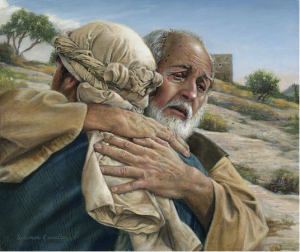 God is watching for our return, and when we turn, and begin to journey back toward fellowship with Him, He casts aside all dignity, and runs with haste to meet us on the road, carrying and helping us when we are tired and weary from the journey. But we must journey back, if we are to return to fellowship in the family.
God is watching for our return, and when we turn, and begin to journey back toward fellowship with Him, He casts aside all dignity, and runs with haste to meet us on the road, carrying and helping us when we are tired and weary from the journey. But we must journey back, if we are to return to fellowship in the family.
And the return journey requires repentance. It requires us to take the time, energy, resources, and locations that we used to use to aid us in our sin, and transforming or redeeming such items to be used in the pursuit of godliness and holiness. We turn away from our habits of sin and turn toward developing habits of righteousness.
Repentance is turning away from patterns and habits of sinful rebellion, and beginning to take the journey back toward God.
Conclusion
So the three elements of spiritual CPR can be summarized in this way: Confession is for those one-time sins we knew were sinful, but which we committed anyway. It keeps sin from setting its hooks and claws into our lives.
Purification is for those one-time or long-term sins we commit, which we didn’t know were sinful until it is pointed out to us through Scripture, the convicting work of the Holy Spirit, or a good friend.
Repentance is for breaking free from the sinful habits or behaviors we have practiced for a very long time which we knew were sinful, but which we practiced anyway. Repentance is needed when sin has hooked into us deeply, and we need the careful hands of the Great Physician to cut the sin out of our bodies, and the healing touch of the Holy Spirit to restore our life and health. Repentance is often a long process, but it is the only way to recover from sinful habits and patterns.
Together, confession, purification, and repentance allow us to practice spiritual CPR in our lives as Christians. Such practices keep our lives free from sin and on the path of righteousness that God wants for us.
Righteousness keeps us healthy and strong as soldiers of Jesus Christ so that we can fight against wicked forces in spiritual warfare. Righteousness keeps our lungs breathing in the pure air the indwelling Holy Spirit, our heart focused on the desires of God, and our belly fill with the meat of the truth of God’s Word.
We take up and put on God’s breastplate of righteousness by removing our filthy clothes stained with sin and replacing them with His practical righteousness. When we get the breastplate of righteousness on, when we get it firmly in place, it becomes much easier to protect our heart.
Only in this way will you protect your life from the deadly and suffocating consequences of sin. Only then will we be able to stop the fiery darts that the devil shoots our way.
 Do you want to learn about spiritual warfare and how to put on the full armor of God? If you want to defeat sin and gain victory in your life over temptation so you can better follow Jesus, take my course on the Armor of God as it is explained in Ephesians 6:10-20.
This course costs $297, but when you join the Discipleship group, you can to take the entire course for free.
Do you want to learn about spiritual warfare and how to put on the full armor of God? If you want to defeat sin and gain victory in your life over temptation so you can better follow Jesus, take my course on the Armor of God as it is explained in Ephesians 6:10-20.
This course costs $297, but when you join the Discipleship group, you can to take the entire course for free.


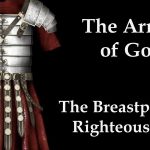

 The bottom line truth we will learn is that a public confession of Jesus is not required to receive (or prove that we have) eternal life. Not even Romans 10:9-10 teaches this idea.
The bottom line truth we will learn is that a public confession of Jesus is not required to receive (or prove that we have) eternal life. Not even Romans 10:9-10 teaches this idea.

 Many use Romans 10:9-10 to teach that if a person is going to truly be a Christian, they are required to make a public confession of faith in front of other people.
Many use Romans 10:9-10 to teach that if a person is going to truly be a Christian, they are required to make a public confession of faith in front of other people.



 So what did the Apostle John mean when he wrote 1 John 1:9? To understand this verse, we need to understand three things. We need to understand the meaning of the word “confess,” the meaning of the word “forgive” and the overall message and theme of 1 John.
So what did the Apostle John mean when he wrote 1 John 1:9? To understand this verse, we need to understand three things. We need to understand the meaning of the word “confess,” the meaning of the word “forgive” and the overall message and theme of 1 John.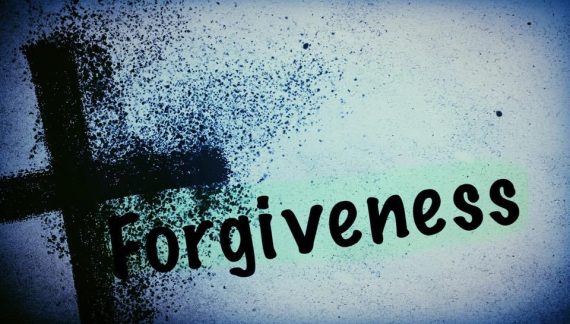
 You can have a relationship with somebody, but not fellowship. For example, if you had a fight with one of your parents several years back, you are still related to them and are still part of the family, but you might not call them on the phone or get together for holidays. You are related, but do not have fellowship. You are not abiding or remaining with them in an ongoing friendship.
You can have a relationship with somebody, but not fellowship. For example, if you had a fight with one of your parents several years back, you are still related to them and are still part of the family, but you might not call them on the phone or get together for holidays. You are related, but do not have fellowship. You are not abiding or remaining with them in an ongoing friendship. The first step in healing this brokenness is by confessing our sin and agreeing with God that what we did was wrong.
The first step in healing this brokenness is by confessing our sin and agreeing with God that what we did was wrong.
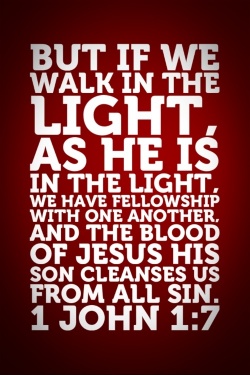 1 John 1:7-10 does get discussed in various ways through my online course “
1 John 1:7-10 does get discussed in various ways through my online course “ And while it is true that they might be guilty of some of the things we accuse them of, the human tendency is to amplify the sinful behavior of others so that we can turn them into monsters, and dehumanize them, so that we can condemn them, or send them into exile, or even kill them in the name of God.
And while it is true that they might be guilty of some of the things we accuse them of, the human tendency is to amplify the sinful behavior of others so that we can turn them into monsters, and dehumanize them, so that we can condemn them, or send them into exile, or even kill them in the name of God. There are
There are  John is primarily interested in make sure that his readers recognize how they have been involved in the violent, bloody, accusatory, scapegoating practices that run this world, and turn from such behaviors to walk in the light of God’s love.
John is primarily interested in make sure that his readers recognize how they have been involved in the violent, bloody, accusatory, scapegoating practices that run this world, and turn from such behaviors to walk in the light of God’s love.